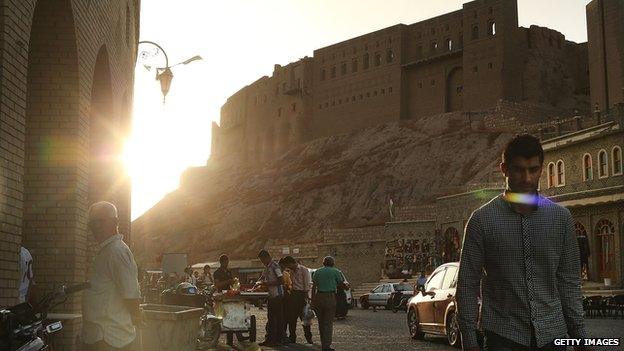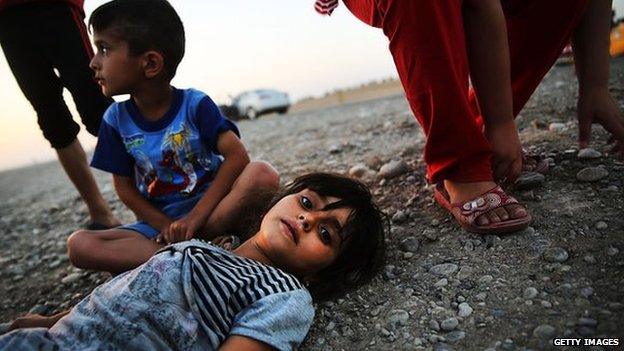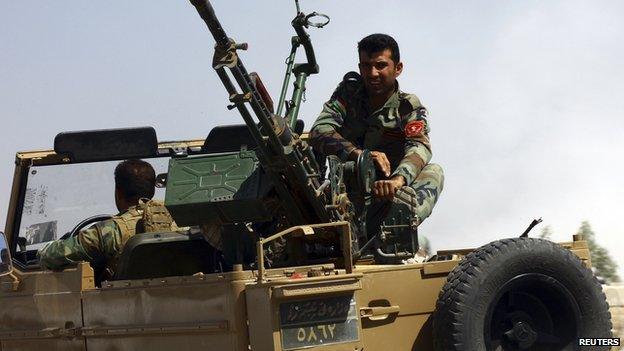Iraq conflict: Why Irbil matters
- Published

Irbil, with its famed citadel, has long been one of Iraq's safest cities
The US is carrying out air strikes against Islamic State (IS) militants, citing in part the need to protect Americans in Irbil, the capital of semi-autonomous Iraqi Kurdistan.
The city has been a base for foreigners and international organisations throughout more than a decade of conflict in Iraq.
Ringed by mountains and checkpoints, Irbil was the safe alternative to Baghdad, its appeal most obvious when the violence elsewhere seemed most ominous.
Foreign visitors to the city enjoyed freedoms unthinkable in other parts of the country - passing from luxury hotel to smoky drinking den without the company of costly and heavily armed bodyguards.
More recently, Irbil has become a destination in its own right for "the internationals" - the expat employees of multinational firms and aid agencies whose presence in Iraq remains a visible legacy of the US-led invasion.
Global oil giants have been setting up shop in the city, lured by the promise of Iraqi Kurdistan's untapped energy reserves. They have driven up real-estate prices and transformed a dusty backwater into an even dustier boomtown. The sand now is from countless building sites, as well as the nearby desert.

Refugees have streamed into Iraqi Kurdistan from Nineveh province
This summer, the US beefed up its presence in Irbil, strengthening the ranks of diplomats and special-forces advisers garrisoned there. The city is being used as a base by the US - echoing its function during the 2003 invasion, when American troops joined Iraqi Kurdish forces to defeat the remnants of Saddam Hussein's army.
Their target this time are the fighters from IS, formerly known as Isis, who have spearheaded a lightning advance across northern Iraq. The largest city to have fallen to the jihadists, Mosul, is just over an hour's drive to the west.
'Fight in the streets'
The capture of Mosul, and of towns and villages across Nineveh province, has sent a tide of refugees into Irbil. Many are from Iraq's Christian and Yazidi minorities, deemed infidels and heretics by IS but promised a safe haven in Iraqi Kurdistan.
For the city's residents, these are nerve-wracking times. The Kurds do not have a country to call their own - but in Irbil, they have a capital. With IS at its gates, they risk losing all that they have built.
Nabaz Khoshnaw, a security consultant in the city, describes a popular mood that veers between panic and bravado. Most people do not expect IS to break through Kurdish defences, he says, although a few have been "freaking out".
"They think Isis will come steal women, decapitate men," he says. While some are ready to run away, says Mr Khoshnaw, others are ready to "send the women to the mountains and… fight in the streets".
'Morals challenged'
While the city is not expected to fall, there is some concern that IS sympathisers or agents could mount attacks inside Irbil. There is also alarm at the plight of the newly displaced.
Irbil residents say the Christian quarter, Ankawa, has been overrun by refugees. Some newcomers have found shelter in schools and churches. Others are camping on the streets. The contrast is startling for a neighbourhood that also houses expensive villas and bars frequented by foreigners.

Kurdish fighters are facing IS on several fronts
"Now the poor Christians from the villages came to that place, which is for rich people and those who want to drink and go to a nightclub, and they're sitting there on the streets," says Mr Khoshnaw. "It's inhumane."
Mr Khoshnaw says local families have set up makeshift kitchens to provide for the refugees. But with IS drawing close, some are now unsure whether they should still be dispensing charity - or stocking up on food themselves. "Your morals are being challenged here, it's very difficult," he says.
An Iraqi Christian businessman in Irbil, who did not wish to be named, says most of the foreign workers in the city are staying put. Rumours have been circulating about IS incursions - but none have been substantiated.
"Isis are looking to destroy everything, but this is not easy," he says. "What's been built by Kurdish people, to be destroyed in a day... it's not easy."
The news of US military action has been greeted with relief, he says. But in the long run, he says, more countries need to support the fight against IS. "We have to have a permanent solution," says the businessman, "to be supported internationally."